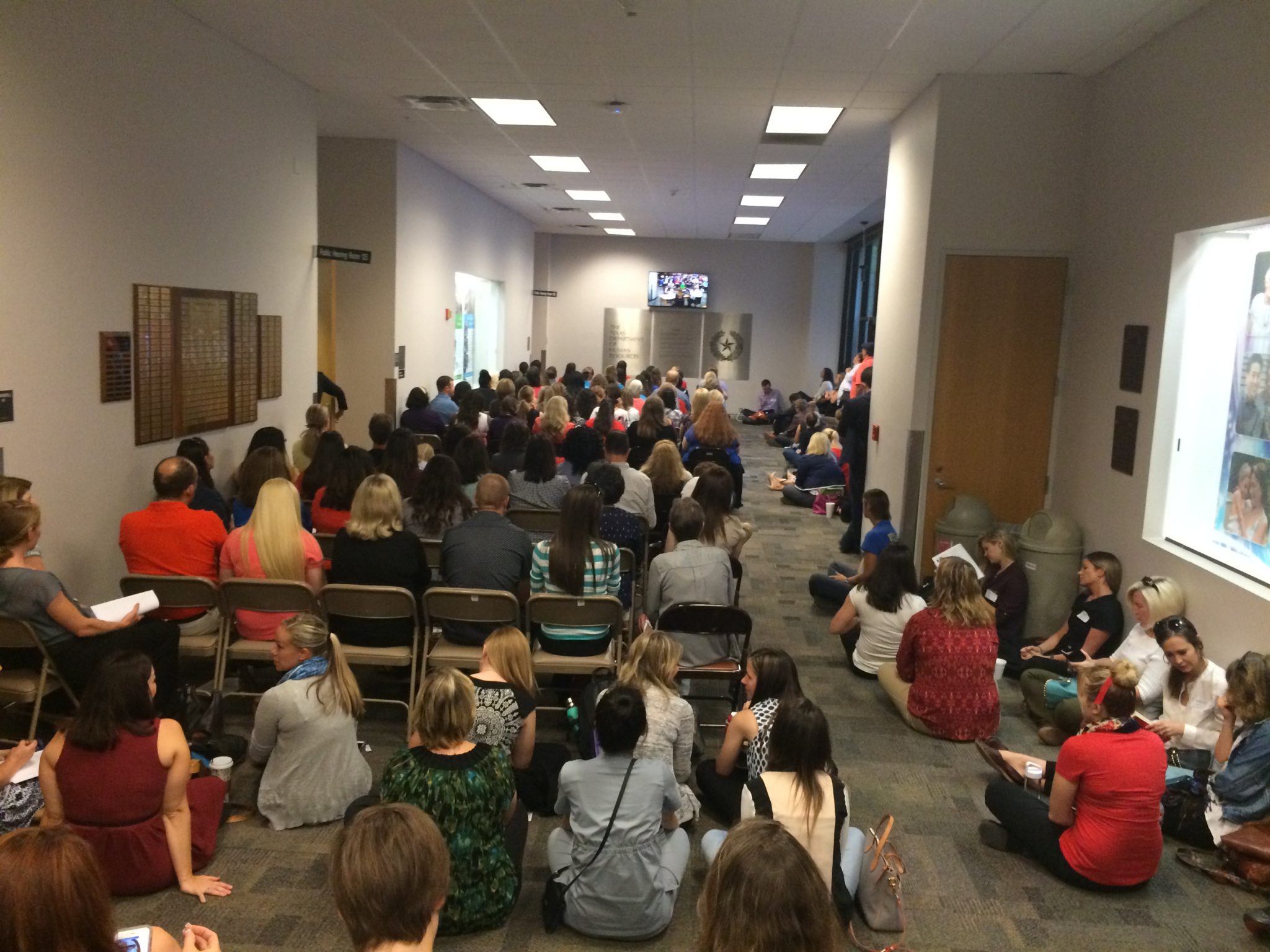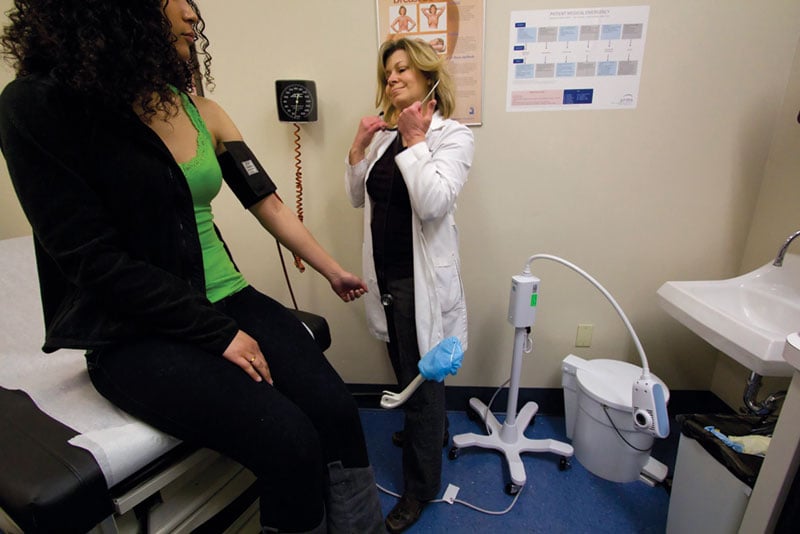
Texas Parents, Therapists Speak Out: No Cuts For Thousands of Special Needs Kids


There were few things Texas legislators loved to talk about more last legislative session than cutting the fat. Generation after generation of conservative lawmakers in this state have been elected on promises that they’ll preside over the care and feeding of a pretty lean animal. They continue to carry with them the deep, and deeply unexamined, conviction that the beast should eat less and produce more.
If you had tuned into nearly any meeting of the Senate Finance Committee earlier this year, you would have heard a lot of agreement on this subject from its members: The state was spending much too much on core functions like health care, they said, and cuts and cost controls were necessary. Especially for Medicaid. State Senators Jane Nelson, Charles Schwertner and Lois Kolkhorst, encouraged by Lieutenant Governor Dan Patrick, all called for dramatic efforts to curb Medicaid spending, even while they helped advance costly tax cut proposals.
So cut they did. A rider in the conference committee’s budget, inserted at the 11th hour, made deep cuts to the Texas Medicaid Acute Care Therapy Program. Some had suggested the state paid too much to provide physical, speech and occupational therapy services for special needs children. But instead of applying a scalpel to the “fat,” they took a hacksaw to the program.
The rider ordered the state to cut $50 million a year from the rates that therapy providers are paid, and an additional $25 million a year by making the therapy services cheaper… somehow. All told, the program would have to “save” $150 million in the next two years, which also meant that it would forfeit $200 million in federal matching funds, for a total of $350 million in funding losses. Legislators were quite literally creating room in the budget to fulfill campaign promises on the backs of the some of the most vulnerable people — most vulnerable children — in Texas.
On Friday, the Health and Human Services Commission (HHSC), which has been struggling to come up with a way to implement the cuts, held a hearing in Austin to take input from stakeholders, the very imagined deadbeats who some legislators claimed had been living large off the state’s money.
That is to say, more than 400 people, many of them parents of special needs children, health care providers, or both, crowded the lobby and halls of the John H. Winters building in North Austin to try to convince the commission to not follow through on the cuts, which advocates said could negatively affect some 50,000 to 70,000 children.
Parent after parent took to the mic to tell HHSC that the agency — and the legislators responsible for the cuts — were robbing their children and their families of possibilities.
Today’s meeting duplicated a July 20 hearing in which commissioners approved the cuts before a subsequent legal effort to force HHSC to reconsider succeeded. The commission has had to restart the process and take more input from stakeholders.
At Friday’s hearing, parent after parent took to the mic to tell HHSC that the agency — and the legislators responsible for the cuts — was robbing their children and their families of possibilities.
Morgan Mobley read testimony while her husband held their 16-month-old child, Jeffrey, on his lap. “You’re taking away from [children’s] future. You’re taking away from their chance to express themselves,” she said. “You’re taking away from their chance to live a better life. You’re taking away from their families and their families’ hope for something better.”
Health care providers warned the commission that making indiscriminate cuts to the rates providers are paid would have cascading consequences for the industry. Therapists are highly educated and skilled, they told the commission, and without adequate compensation, some therapists would be forced to leave the field. With lower Medicaid reimbursement rates, “benefit cuts will take place across our industry,” said one speech therapist. Money for continuing education would be less available. Several witnesses spoke of a shortage of skilled workers already, along with wait lists for therapists and home care workers, which would only be exacerbated by the rate cuts.
One therapist, who described himself as a “staunch conservative” from West Texas, told the commission that therapy cuts would hurt rural children disproportionately, as they already have less access to specialized care than do kids living in cities. He often travels between 20 and 100 miles to make home visits, he said, and he does it for the joy of helping children. But as costs for doing business go up — partially as a result of increased regulation from state and federal agencies — he said he and his colleagues are facing falling reimbursement rates. And that, he said, is “unsustainable as an industry.”
More than 400 people signed up to testify, but many came simply to show support. Courtney Hammermeister, a speech therapist who works in Central Texas and mother of a special needs child, said the impending cuts would threaten a core part of effective therapy: the home visit.
“I have children that can’t make it to school, can’t make it to clinics. The parents aren’t able, don’t have the economic means or just the means to get their children there. This would just be devastating for the community,” she said. Home visits — the ability to learn in a “comfortable environment” — were a critical part of her own daughter’s successful experience with therapy, she said.
People came to testify in part because the political winds seem to be shifting. After weeks of backlash and public attention, it appears possible that HHSC will relent on the cuts or mitigate their damage to some extent. House Speaker Joe Straus and both state Senator Jane Nelson and state Representative John Otto, the chief budget-writers in each chamber, have asked the state agency not to cut therapy money in a way that endangers access to care — though how any substantial sum can be cut from a major health care program without endangering that access seems like an impossible task.
A few Democrats testified today, too, including state Representative Trey Martinez Fischer and state Senator José Menéndez, who are widely anticipated to face each other next year in a primary rematch for San Antonio’s Senate District 26. Both men lambasted the cuts and threatened the agency with the possibility of consequences in future legislative sessions.
Martinez Fischer noted the absurdity of cutting Medicaid when the state had a budget surplus. “This appears to be an idea, someone’s idea, a proposal in the budget that was never clearly vetted by both chambers,” he said. Budget riders are subject to interpretation by state agencies, he said, and lawmakers had now made clear their desire not to hurt access to care. So, he asked: “Why or how did we get to the juncture where we are going to put 60,000 children in jeopardy over a misunderstanding of what a rider means?”
“I have protected this agency on many occasions,” he said, adding that his protection came out of “compassion” for the agency and its “mission.” But, he cautioned: “If the mission of the agency is to do what’s politically convenient instead of what’s right, I’m not so sure I should be standing up on the floor of the House.”
Menéndez said the sense of fear forced on the families of special needs kids by the proposed cuts was “disgusting” and also asserted that the budget rider did not reflect the Legislature’s true intention. If the cuts were adopted, it might be time, he suggested for a closer look at how the agency does business next session.
The 84th Legislature provided an excellent opportunity for Texans to have a proper debate about the kind of government they want. But the long-term needs of the state’s residents — like health care, education and transportation — have been chronically starved of funds as the population grows and we repeatedly cut taxes. But questions about the state’s priorities were mostly kicked down the road on Sine Die.
These cuts provide a new opportunity for that long-delayed debate: When the state denies its agencies necessary funds, there are consequences. Especially when there’s little fat to trim in the first place.


